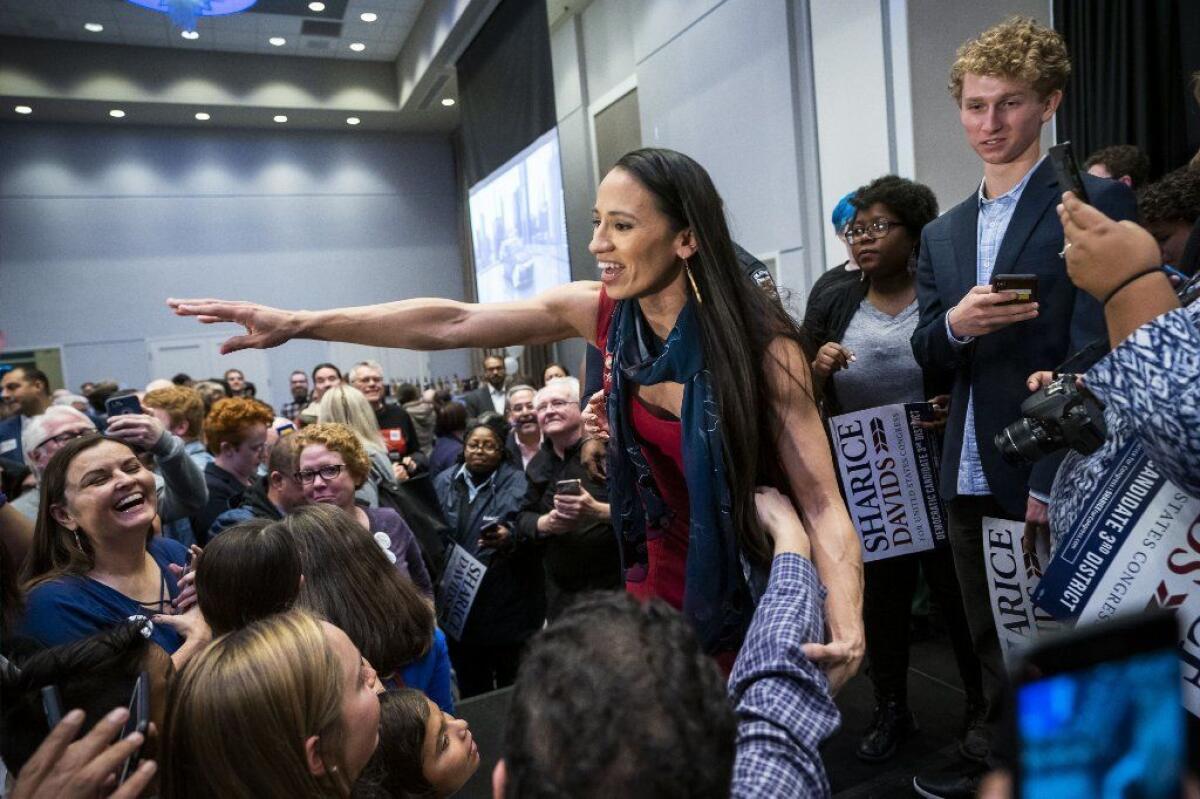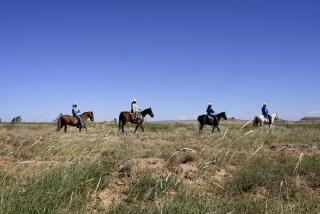It appears CNN deemed Native Americans ‘something else,’ sparking a backlash

This presidential election is something else.
On Tuesday night, CNN’s live election coverage included an on-air graphic that used the phrase “something else” to refer to voters who are not white, Latinx, Black or Asian.
Native and Indigenous Americans are not happy about what they see as an insult.
“This type of language continues the efforts to erase Indigenous and other voters who don’t neatly fall into the race categories listed in the graphic,” the Native American Journalists Assn. (NAJA) said in a statement Thursday.
“Being Native American is a political classification — not merely a racial background,” NAJA continued. “Native nations have had a government-to-government relationship with the United States since the country’s earliest days. To refer to Indigenous voters as ‘something else’ fails to recognize the sovereignty and political classification of Native voters.
IllumiNative, a Tulsa, Okla.-based nonprofit that works to increase Native visibility, noted Native volunteers who helped to get out the first-time and elder vote this election.
A record-breaking six Native Americans were elected to Congress this week. Kansas Rep. Sharice Davids (D), Oklahoma Reps. Tom Cole (R) and Markwayne Mullin (R) and New Mexico Rep. Debra Haaland (D) won reelection. In Hawaii, Rep.-elect Kaiali’i Kahele (D) won for the first time, as did Rep.-elect Yvette Herrell in New Mexico (R).
Those elected split down the middle: three Republicans and three Democrats. All in all, 13 Natives from eight states had been running for 11 House seats in this year’s election.
Actor Mark Ruffalo backed IllumiNative’s criticism of CNN, thanking Native voters for “getting us over the line in key swing states.”
The largest survey ever done among Native Americans, the Indigenous Futures Survey — which reached more than 6,400 Native peoples, representing 401 tribes from 50 states — found that 77% of participants reported voting in the last election.
“You deserve to be seen and acknowledged,” tweeted Ruffalo, a longtime Native ally who supported the Standing Rock tribe’s in its opposition to the Dakota Access Pipeline project in 2017.
The Indigenous Futures Survey, conducted in part by IllumiNative, found an engaged Native electorate in seven key swing states: Michigan, Wisconsin, North Carolina, Arizona, Colorado, Minnesota and Nevada.
Of those swing states, former Vice President Joe Biden flipped Michigan and Wisconsin. Colorado and Minnesota continued their 2016 trend of voting Democratic, although both were contested. North Carolina, Arizona and Nevada are still tallying votes.
On Wednesday afternoon, when Arizona was still up in the air, Native TV writer Lucas Brown Eyes (“Young & Hungry”) highlighted that the state is home to 330,000 Indigenous potential voters. The margin for a Democratic win at the time was 93,000 votes.
“NAJA demands CNN issue a public apology and is willing to meet with senior editorial staff to discuss how to improve the network’s coverage of Indian Country,” the journalism group said in its Thursday statement. “In the interim, NAJA encourages CNN’s senior newsroom leadership and staff to utilize its online reporting resource guides moving forward.”
The “something else” controversy is part of a larger conversation about how the media cover voters of color in the lead-up to elections.
“Our Future,” a powerful new poster designed to rally Indigenous peoples to vote, was conceived by Ernesto Yerena, Arlene Mejorado and Shalene Joseph.
In southern Florida, President Trump picked up nearly half of Latino voters, eventually winning the state and shocking some pundits who predicted the opposite. Chuck Rocha — founder of Nuestro PAC, a pro-Biden group focused on turning out Latino voters — talked to The Times’ Brittny Mejia about the phenomenon.
“If I have to hear one more ... white person on TV talk about our community not being a monolith,” Rocha said. “Last night, it was like the Latino community was listening this whole time and being, ‘Let me just show you how much we are not a monolith.’”
Native Twitter responded to CNN’s “something else” snafu with a mixture of outrage, anger and some sarcastic humor. The “something else” meme took off.
One Twitter user lamented that “they put us as ‘other’ and now ‘something else.’ It shouldn’t be a meme, shirt, hat, or mask.”
Others, however, inverted the perceived insult. Another Twitter user made a snarky reference to Native American Heritage Month, which runs through November.
Here’s a sample of what others had to say:
More to Read
The complete guide to home viewing
Get Screen Gab for everything about the TV shows and streaming movies everyone’s talking about.
You may occasionally receive promotional content from the Los Angeles Times.







